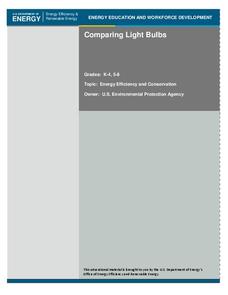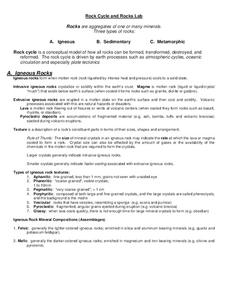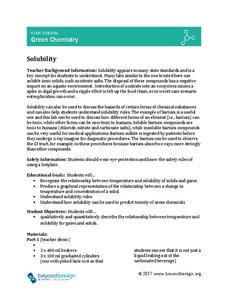EngageNY
Notices, Wonders, and Vocabulary of the Third Stanza of “If”
How does one's experience reading a poem's text differ from listening to its audio version? Delve into the insightful question with the poem, If by Rudyard Kipling, as pupils compare and contrast their experience using a note-taking...
Virginia Department of Education
Electricity and Magnetism
Take charge of your class and provide them with an electrical experience! Individuals investigate the basic principles of electricity and magnetism by creating a model to test electric current and the amount of electricity generated....
Virginia Department of Education
The Law of Conservation of Matter
The Law of Conservation of Matter can be complex for young scientists to fully grasp. Use this experiment to help simplify the process as pupils perform two experiments to determine mass: one that melts a substance and the other that...
National Wildlife Federation
Soil Decomposers
Worms are the kings of the decomposers. A four-part lesson has learners experiment with the characteristics of earthworms and their sensitivities. They vary factors such as light, acidity, temperature, and touch of soil and observe the...
BioEd Online
Center of Gravity
Between the pull of gravity and the push of air pressure, it's a wonder animals can balance or move at all. With a hands-on lesson about the center of gravity, learners discuss their own experiences with the topic, then work with...
Curated OER
Comparing Light Bulbs
An average home produces twice as many emissions as an average car. Teach your class how to reduce energy consumption by replacing standard incandescent light bulbs with compact fluorescent light bulbs. Perform an experiment to compare...
NOAA
Off Base
How does carbon dioxide affect the world's oceans? The final installment in a series of six lessons has pupils research ocean acidification, then conduct an experiment to witness the delicate balance that exists in our seas. Materials...
Facing History and Ourselves
Blending In and Standing Out
An excerpt from Sarfraz Manzoor's memoir about how his experiences as a Pakistani growing up in England shaped the way he though about his identify provides a stimulus for a discussion of how experiences can shape our concept of identity...
Overcoming Obstacles
Good Citizenship
An individual's background and experiences affect their worldview and interaction. In this lesson, scholars draw a pair of glasses with pictures of experiences they've been through, relate the responsibility to social media and the...
Berkshire Museum
Nature Journaling: Experience the Outdoors Through Writing and Drawing
Step into the great outdoors and develop young scientists' skills of observation with a nature journaling lesson plan. Given a specific focus or goal, children practice making and recording observations of nature through written...
TCI
The 57th Inaugural Ceremonies
Attend the party of the year with a hands-on learning experience focusing on the 57th inauguration of the president of the United States. Middle schoolers role play as guests at the prestigious Inaugural Ball, and learn...
Visa
Credit Cards
Choosing your first credit card can often be an intimidating and confusing experience for young adults. Give your pupils the foundational knowledge they need for tackling this process head-on, including learning to...
US Navy
The Science of Diving
Introduce gas laws using the popular topic of SCUBA diving. This activity makes a connection between the gas laws and the effect of pressure and temperature changes during diving. Young engineers complete introductory experiments to...
American Chemical Society
Molecules Matter
Did you know that jumping spiders sometimes wear water droplets as hats? A seventh grade science lesson introduces the concept of what makes up water: tiny molecules that are attracted to each other. Starting with a...
EngageNY
Grade 9 ELA Module 3, Unit 1, Lesson 2
Autism isn't an illness or a disability. In the first chapter of Animals in Translation, we learn about Temple Grandin's unique ability to understand animals through her experience with autism. Having read pages four through eight for...
EngageNY
Experiments with Inscribed Angles
Right angles, acute angles, obtuse angles, central angles, inscribed angles: how many types of angles are there? Learners first investigate definitions of inscribed angles, central angles, and intercepted arcs. The majority of the...
University of New Orleans
Rock Cycle and Rocks Lab
Science rocks! Explore three types of rocks and the rock cycle with an igneous rocks experiment. Pupils discuss textures, composition, and learn how melts are formed from the Earth's crust. They weigh materials using a scientific scale...
Virginia Department of Education
The Germ Theory and Koch’s Postulates
Explore the history of cholera and its effect on society with your biology class. Young biologists will then proceed to grow their own germs, prepared from live cultures, and follow the steps of the scientific method to generate data....
Santa Monica College
Chemical Equilibrium and Le Chatelier’s Principle
Henri-Louis Le Chatelier wrote many papers throughout his 85-year life, but he is remembered for one of his earliest discoveries, now known as Le Chatelier's Principle. The final lesson plan in an 11-part series encourages young chemists...
Beyond Benign
Exothermic and Endothermic Reactions
How can you tell the difference between endothermic and exothermic reactions? Chemistry scholars perform and observe two chemical reactions, measure the temperature throughout, then draw conclusions about changes in energy from their...
Beyond Benign
Solubility
Enhance your class' ability to understand solubility. Science scholars examine how temperature and concentration affect solubility using an interesting lab experiment. The introduction and procedure also discuss the relationship between...
Nuffield Foundation
Assessing Human Hearing
Young scientists explore hearing through multiple experiments, demonstrations, and activities. They focus on the changes in hearing over a lifetime, how we can determine where a sound is coming from, and the ability to filter noises.
Nuffield Foundation
How Good is Your Toilet Paper?
You'll never forget the importance of toilet paper and hand washing ever again. Scholars perform an experiment to model the transfer of microbes in the bathroom. They perform three trials to test the transmission of yeast using their...
Nuffield Foundation
No Stomach for It: Investigating Antacid Medication
You won't get a stomachache doing an investigative experiment. Pupils simulate the effect of antacids on stomach acid. Obviously, they won't be using real stomach acid; diluted hydrochloric acid serves this purpose.
Other popular searches
- Science Experiments
- Friction Experiments
- Water Pollution Experiments
- Life Science Experiments
- Density Experiments
- Air Pollution Experiments
- Electricity Experiments
- Egg Science Experiments
- Egg Experiments
- Chemical Change Experiments
- Rocket Experiments
- Cloud Experiments























